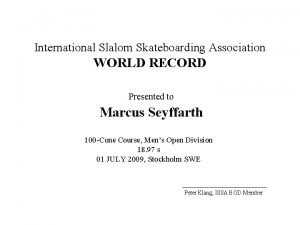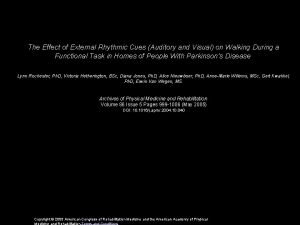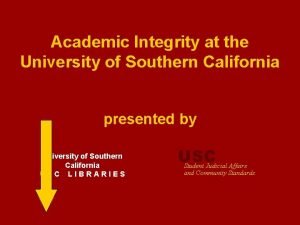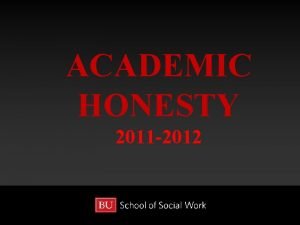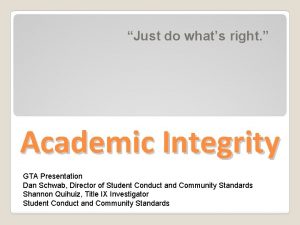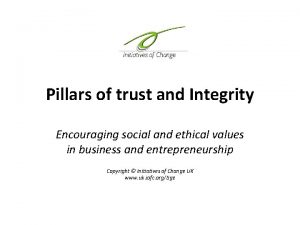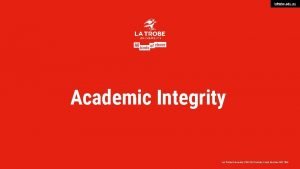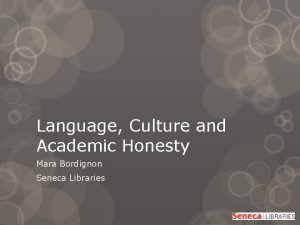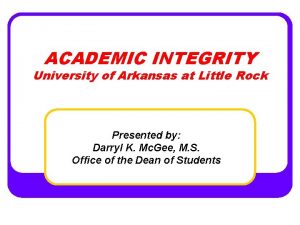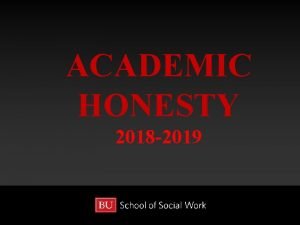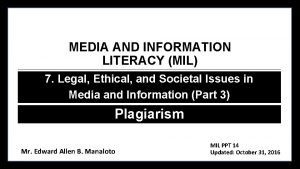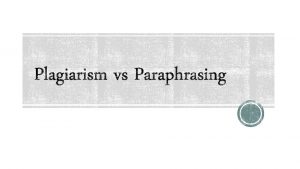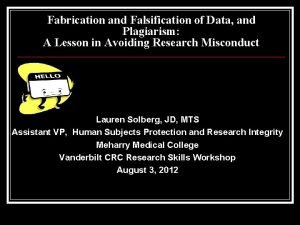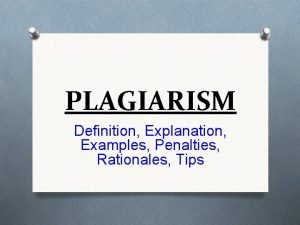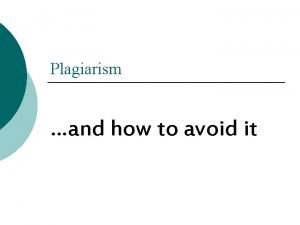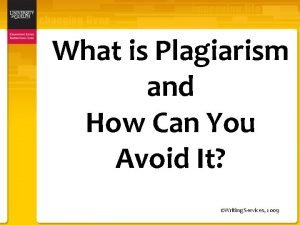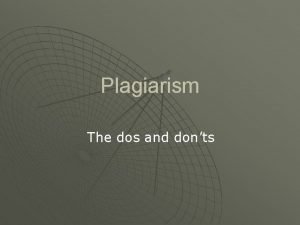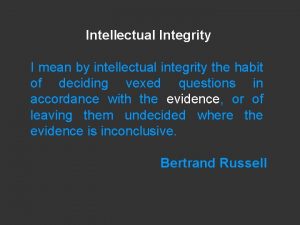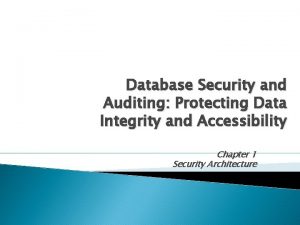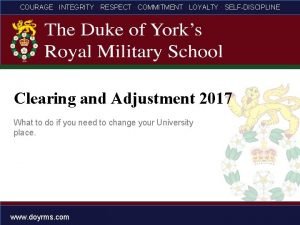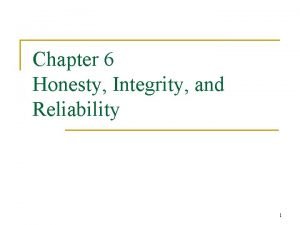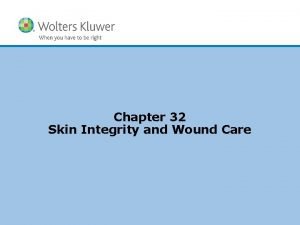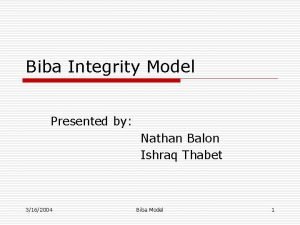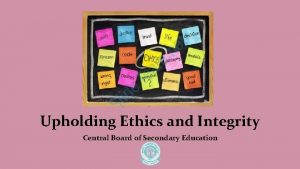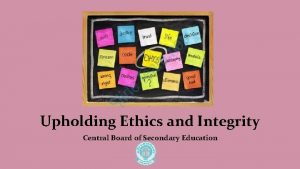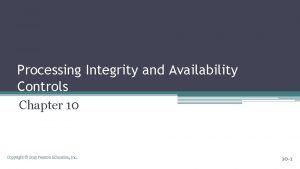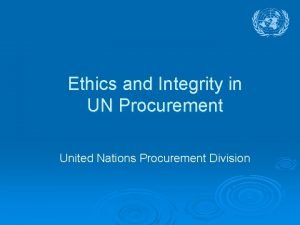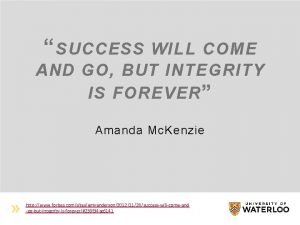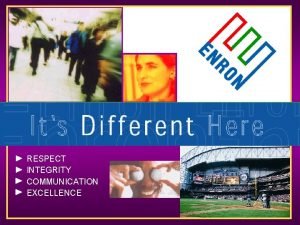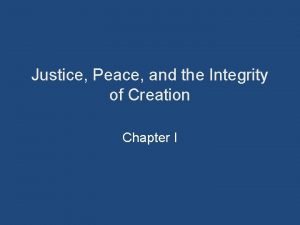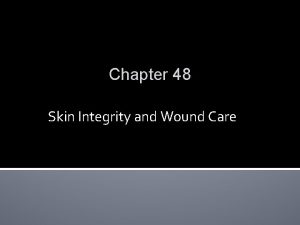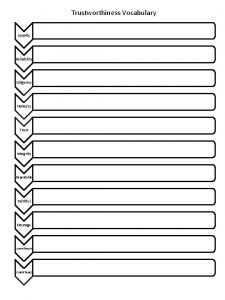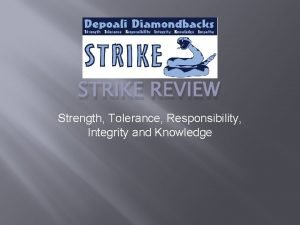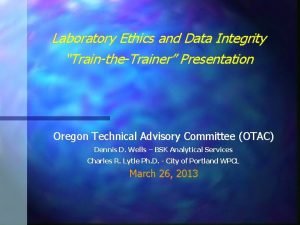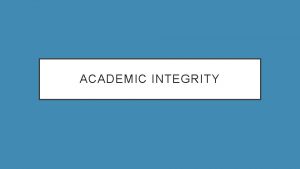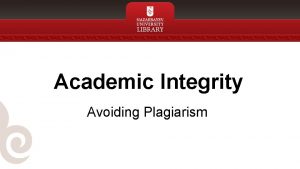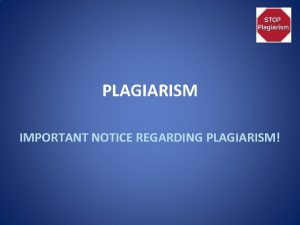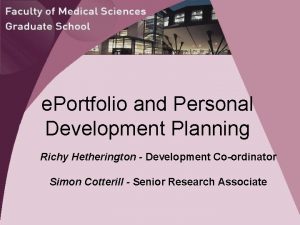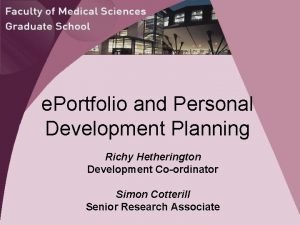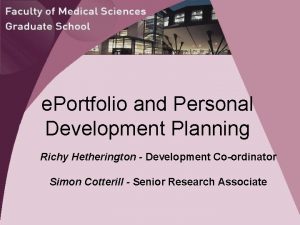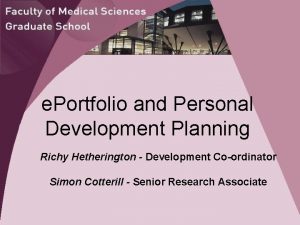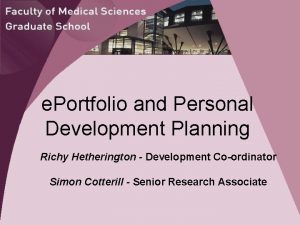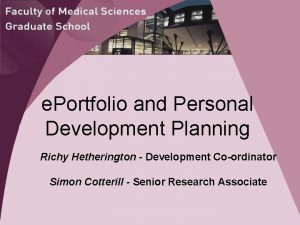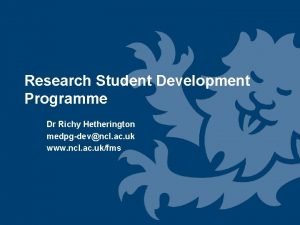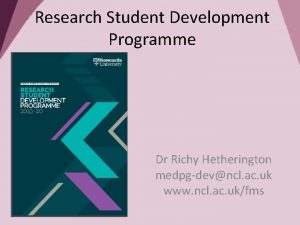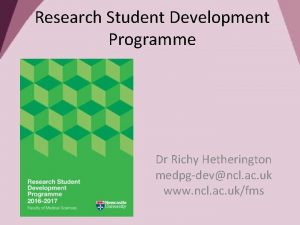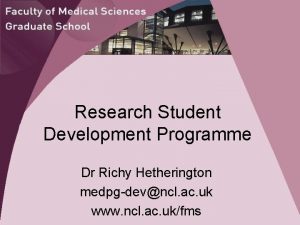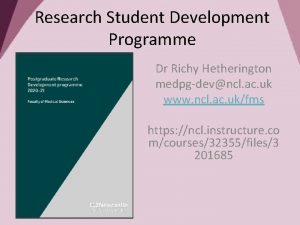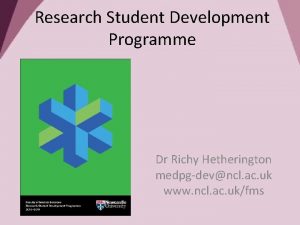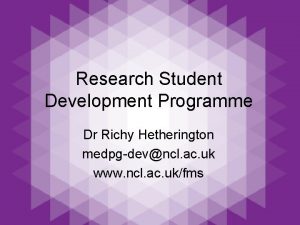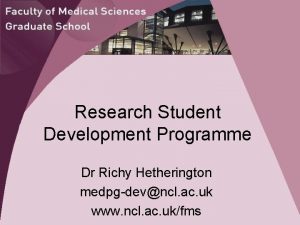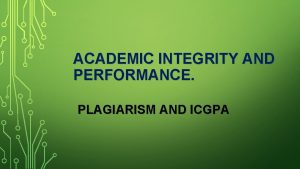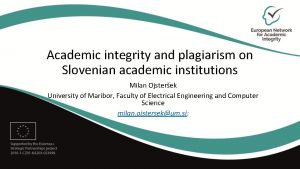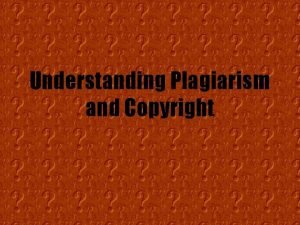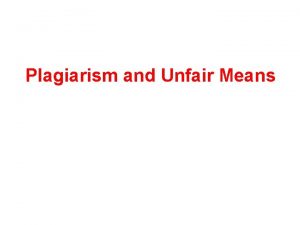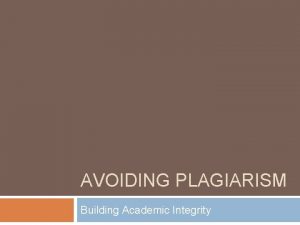Academic Integrity and Plagiarism Dr Richy Hetherington Alex










































- Slides: 42

Academic Integrity and Plagiarism Dr Richy Hetherington Alex Inskip

Do you agree to take part? 1. 2. 3. Yes No I don’t know yet

Which of the following professional bodies are you a member of 1. 2. 3. 4. 5. 6. General Medical Council The Health Professions Council The Science Council Chartered Scientists British Association of Accredited Researchers None of the above

Professional Bodies Registers doctors to practise medicine in the UK. Promote and maintaining the health and safety of the public by ensuring proper standards in the practice of medicine. A regulator protecting the public by registering health professionals ensuring standards of training, professional skills, behaviour and health. membership organisation representing the learned societies and professional institutions A single chartered mark for all scientists, recognising high levels of professionalism and competence in science B. A. A. R. I made that one up, to test your integrity

Project Approval

Ethics advice § Research Ethics 14 th Feb § Research Governance www. ncl. ac. uk/fms/postgrad/skills/Research. Governance. htm § Institute of Neuroscience Psychology Ethics Committee § Research Ethics in a Wider context - for 2 nd year and above only § Your Handbooks for Research students § http: //www. ncl. ac. uk/research/ethics_governance/

Funding Integrity § Pharmaceuticals manufacturer support § Other interested parties § E. g. Dr Andrew Wakefield

Experimental Integrity: Can the circled data point be dropped 1. 2. Yes no

Should you publish this result? 1. Y es 2. No sample Control

Is it acceptable to manipulate a gel image for publication or your thesis? 1. Yes 2. No "Gel electrophoresis 2" by Mnolf - Photo taken in Innsbruck, Austria. Licensed under CC BY-SA 3. 0 via Wikimedia Commons http: //commons. wikimedia. org/wiki/File: Gel_electrophoresis_2. jpg#mediavie wer/File: Gel_electrophoresis_2. jpg

Authorship and Acknowledgement Should a technician who produced results but had no input to design or interpretation of results be an author? 1. 2. YES NO

Open Access Publishing

Reproducibility 1. You read a paper with an interesting experiment but you aren’t sure about the result, you follow the methods but can’t get the same result in the paper. 2. Is this the authors problem or 3. your problem? 4. 5. Authors problem Your problem

Maintaining academic integrity in research § Avoiding Misconduct § Fabrication (inventing data) § Falsification (distorting data or results) § Plagiarism (copying) § Consider whether you have an intention to deceive

Duplication, redundancy or self plagiarism § Sending the same article to more than one journal § Using the data twice without a significantly different outcome § Copying your introduction for another piece of work § Using data generated from one degree e. g. MRes or MSc in another Ph. D

Ukrio. org

Reference Scientists behaving badly Brian C. Martinson, Melissa S. Anderson & Raymond de Vries Nature 435, 737 -738(9 June 2005) The 'self-plagiarism' oxymoron: can one steal from oneself? Chrousos GP, Kalantaridou SN, Margioris AN, Gravanis A. Eur J Clin Invest. 2012 Mar; 42(3): 231 -2. Manipulation and Misconduct in the Handling of Image Data Cathie Martin, Editor-in-Chief The Plant Cell and Mike Blatt, Editor-in-Chief Plant Physiology The Plant Cell September 2013 vol. 25 no. 9 3147 -3148 http: //blogs. discovermagazine. com/notrocketscience/ Promoting an open research culture B. A. Nosek et al http: //sciencemag. org/content/sci/348/6242/1422. full. pdf

Plagiarism - what’s okay and what’s not Alex Inskip Walton Library

Academic integrity – the dilemma § Show you have done your research… BUT § …write something new and original § Appeal to experts and authorities… BUT § …improve upon or disagree with experts and authorities

Academic integrity – the dilemma § Demonstrate you ability to write by mimicking what you hear and read… BUT § …use your own words and voice § Give credit where credit is due… BUT § …make your own significant contribution.

Academic integrity – the dilemma § Remember…supervisors and other readers will not be able to tell if plagiarism is deliberate or not.

You are under pressure with your lab experiment which then goes wrong. Your colleague ran a similar experiment last week and gives you the figures. You use them in your report. Is this: 1. Acceptable practice? 2. Plagiarism? 3. Collusion?

When writing your research, you take short phrases from a number of sources, add your own words to make a coherent structure and list all your sources in your bibliography. Is this: 1. Acceptable practice? 2. Plagiarism? 3. Collusion?

What is plagiarism? Copying another's work or borrowing someone else's original ideas According to the Merriam-Webster Online Dictionary, to ‘plagiarize’ means: § “to steal and pass off (the ideas or words of another) as one's own” § “to use (another's production) without crediting the source” § “to commit literary theft” § “to present as new and original an idea or product derived from an existing source” Source: Merriam-Webster Online Dictionary. https: //www. merriamwebster. com/dictionary/plagiarize (accessed 19/9/2018)

How might I plagiarise? There are many forms of plagiarism, all boiling down to the same core issue: lack of clarity about where material has come from. The following ‘types of plagiarism’ slides use concepts from Oxford University Plagiarism webpages. https: //www. ox. ac. uk/students/academic/guidance/skills/plag iarism [accessed 19/9/18]

Copying and pasting Reusing material verbatim (whether retyped or literally copyand-pasted) without acknowledgement is plagiarism. Side note on copying and pasting from the web: Information found on webpages must be referenced, just like books, journals or anything else. (Though also remember: it’s important to carefully evaluate all material found on the Internet before use, as it may not have been through the same scholarly peer review process as published sources).

Copying and pasting, continued Trying to obfuscate copied text by changing a few words is still very much plagiarism. Adding in some sentences of your own between the copied text: still plagiarism. Copying and pasting from multiple sources mixed together: still plagiarism.

Quoting directly without indicating that it’s a quote Even if you reference your source material, direct wordfor-word quotations must also always be clearly identified as such using quotation marks or indentation to show that the words (as well as the ideas) are taken from that source. Failure to do so: plagiarism. It should always be apparent to the reader which parts are your own independent, where you have drawn on someone else’s ideas, and when you are using others’ ideas, whose language is being used.

Paraphrasing Rewording ideas/facts/concepts/arguments taken from other sources without appropriate referencing to show that they are not your own is plagiarism. Your text might include none of the original wording from the original source, but if you’re presenting their ideas, those need referencing. This includes lecture notes. However, this does not include universally/very widely acknowledged concepts.

Insufficient citation You need to cite each instance where you refer to your sources. Just because you’ve referred to a source once, doesn’t mean you can return to that source later in the document (when it may not be clear that’s what you’re doing) without citing it again at that point too.

Incorrect citation It is important to cite correctly and consistently – most subjects have a preferred style. There are two elements necessary when referencing: § an in-text citation within your work at the point of use § a complete reference list at the end of the document For most science subjects, the idea of a ‘wider reading’ bibliography is not applicable – only material directly cited should appear in the reference list.

Self-plagiarism Yes, you can plagiarise yourself: § “Every time you submit work for an assessment it should be fresh work - no one (including you) should not have already submitted the work (or similar work) for an assessment at Newcastle or elsewhere” § http: //www. ncl. ac. uk/right-cite/Student/

Plagiarism detection Those assessing work will be experienced in spotting plagiarism. And they’ll be assisted by the automated Turnitin system.

So…when should you give credit? Any time when you refer to someone else’s words or ideas Including: § When using information gained through interviewing someone § When using someone else’s data, e. g. to create a graph § When using someone else’s images (PLUS there are potential copyright issues for images)

When researching, note-taking or interviewing § Make sure you indicate clearly when the words belong to someone else – use quotation marks or a ‘Q’ in the margin. § Always keep a full record of your sources (page numbers, titles etc) § Always acknowledge in your final text using in-text citation, footnotes, bibliography, quotation marks or indirect quotations.

When paraphrasing or summarising § Write your paraphrase or summary from memory – don’t look at the original text. Then check with the original for accuracy. This will help ensure it fits in your own writing style. § In your work, begin by giving credit: According to Esther Blodgitt…

Quotes § Use when you have unique phrases § Mention the author somewhere in the sentence and use quotation marks § Don’t use too many – it starts to look like there’s not many of your own ideas in your work

Where to go for further information § Pears, R. & Shields, G. J. (2016) Cite them right: the essential referencing guide. 10 th edn. London, Palgrave. § Cite them right is also available online: https: //www. citethemrightonline. com/ § Lipson, C. (2011) Cite right : a quick guide to citation styles-MLA, APA, Chicago, the sciences, professions, and more. 2 nd edn. Chicago; London: University of Chicago Press. § University Student Handbook. § Course documentation.

End. Note § Software designed specifically for storing and managing bibliographic references § Compile personal ‘libraries’ of records for references – either by adding details manually, or importing from bibliographic databases (e. g. Medline) § Produce reference lists in Word documents § Add in-text citations § Produce an automatic end-of-text bibliography § Easily change the style

You have found a fantastic article. You copy out a few sentences word for word, include quotation marks and an in text citation and include full details in your bibliography. Is this? 1. Acceptable practice? 2. Plagiarism? 3. Collusion?

You want to use a graph from a textbook. You contact the author who gives you permission and you reference it in your bibliography. Is this: 1. Acceptable practice? 2. Plagiarism? 3. Collusion?

Questions? § Comments? Questions? § Or later: medliaison@ncl. ac. uk
 Richy hetherington
Richy hetherington Issa slalom
Issa slalom Ian hetherington death
Ian hetherington death Peter hetherington
Peter hetherington Victoria hetherington
Victoria hetherington Usc plagiarism policy
Usc plagiarism policy Tcnj academic integrity
Tcnj academic integrity Five fundamental values of academic integrity
Five fundamental values of academic integrity Whats academic integrity
Whats academic integrity 5 pillars of academic integrity
5 pillars of academic integrity Studiosity la trobe
Studiosity la trobe Mla citation seneca
Mla citation seneca University of arkansas academic integrity
University of arkansas academic integrity Six fundamental values of academic integrity
Six fundamental values of academic integrity The forgotten footnote example
The forgotten footnote example Difference between plagiarism and paraphrasing
Difference between plagiarism and paraphrasing Define fabrication and falsification
Define fabrication and falsification Penalties definition
Penalties definition What is plagiarism and how to avoid it
What is plagiarism and how to avoid it What is plagiarism and how can you avoid it
What is plagiarism and how can you avoid it Plagiaat uu
Plagiaat uu Integrity meaning
Integrity meaning Basic trust vs mistrust example
Basic trust vs mistrust example Database security and integrity
Database security and integrity Loyalty integrity courage
Loyalty integrity courage Honesty integrity and reliability
Honesty integrity and reliability Serosanguineous vs serous
Serosanguineous vs serous Biba model
Biba model Upholding ethics
Upholding ethics Upholding ethics and integrity in school
Upholding ethics and integrity in school Processing integrity and availability controls
Processing integrity and availability controls Ethics and integrity at the united nations
Ethics and integrity at the united nations Toonpool
Toonpool Respect integrity communication and excellence
Respect integrity communication and excellence The principles of professionalism
The principles of professionalism Integrity of creation reflection
Integrity of creation reflection Integrity of creation
Integrity of creation Honesty discussion questions
Honesty discussion questions Chapter 48 skin integrity and wound care
Chapter 48 skin integrity and wound care Honesty vocabulary
Honesty vocabulary Knowledge strength integrity
Knowledge strength integrity Laboratory ethics and data integrity
Laboratory ethics and data integrity Integrity and professionalism
Integrity and professionalism

